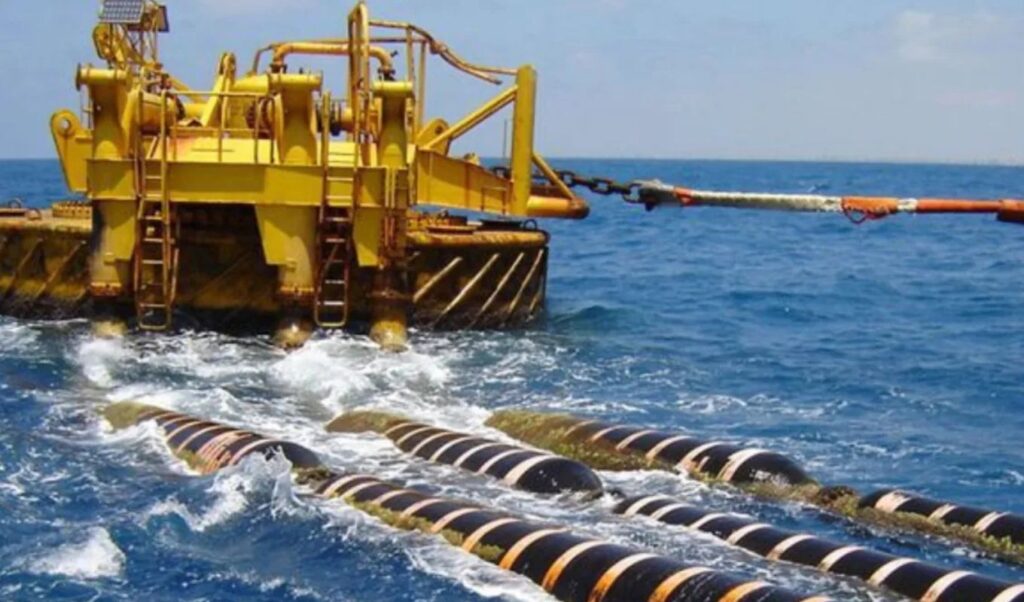The electrical interconnection project between Greece and Cyprus is once again at risk of derailment, with the GSI Interconnector cable facing implementation obstacles due to a conflict between ADMIE (Greece’s Independent Power Transmission Operator) and Cyprus’ Energy Regulatory Authority (CERA) regarding the project’s financial aspects. This new crisis emerged following a report by “Phileleftheros” newspaper claiming ADMIE is demanding multiple times the initially agreed 25 million euros first installment, casting shadows despite last week’s positive meeting between Greek Prime Minister Kyriakos Mitsotakis and Cyprus President Nikos Christodoulidis in New York. The Cyprus President has now launched a fierce attack against ADMIE’s chairman, accusing him of “blackmailing the Republic of Cyprus.”
Christodoulidis fires at ADMIE over cable: The Cypriot government will not be blackmailed
Nikos Christodoulidis commented with particularly pointed tone on the newspaper report, stating: “First, let me note that I was informed through the front page you referenced. I should point out that for this specific project there is complete understanding and agreement framework between the Greek and Cypriot governments. Recently in New York, we agreed with the Greek Prime Minister on how to proceed very specifically, and indeed a relevant announcement was issued.”
“From that point forward,” continued the President of the Republic of Cyprus, “and I want to mention this, if the head of ADMIE thinks that with such letters or paid advertisements the Cypriot government can be blackmailed, he obviously doesn’t know who he’s dealing with. The Cypriot government will not be blackmailed by any head of ADMIE, and the Cypriot government is here only to support the interests of the Cypriot people. This is the clear message to the head of ADMIE.”
When a journalist noted that the Greek government is a major shareholder in ADMIE, President Christodoulidis said that “it’s not the Greek government that decides on the letters ADMIE sends, because with the Greek government there is a framework for how the project proceeds, for everyone’s obligations, and there is also the recent joint announcement by the Greek Prime Minister and myself, following our meeting in New York.”
ADMIE categorically denies claims
ADMIE categorically denies information contained in the Cypriot website philenews report titled “Revealing: ADMIE declares war over the cable – Bomb letter to CERA – Preparing for court appeal,” regarding its claims about the amount of expected compensation from CERA for the Greece-Cyprus electrical interconnection project.
ADMIE recognizes and claims the agreed first installment of 25 million euros and denies the arbitrary and unverified information in the report about immediate claims for 82 million euros.
ADMIE, based on its contractual right, filed an objection within the deadline against CERA’s decision of July 31, 2025, which recognized as total expenditure by the implementation body for the Great Sea Interconnector project only 82 million euros, versus approximately 302 million euros (251 million euros for the cable alone), which constitute verified investment expenses to date.
ADMIE recognizes the recoverable amount of 25 million euros for 2025 as an advance on the project’s actual revenue, but claims recognition by CERA of all its actual expenses to date, even if their recovery occurs after the project’s electrification. The objection provides all necessary evidence that must be considered.
What the Phileleftheros report states about the cable
The Phileleftheros report states the following:
From reversal to reversal – and on very dangerous paths for Cyprus-Greece relations – the electrical interconnection project is being led, with ADMIE reacting to the Republic of Cyprus’ delay in paying the agreed first installment of 25 million, demanding from CERA… multiples more!
Phileleftheros learns that the project implementation body submitted an objection to CERA against the regulatory authority’s decision dated July 31, 2024, approving expense recovery of 82 million euros, with collection rights of only 25 million for January-December 2025. Information suggests ADMIE is demanding recognition of recovery rights for 251 million euros for expenses incurred so far, before project completion.
With the objection, ADMIE seeks cancellation of the July decision – for which it had pressured intensively for a long period – and its replacement with another, through which recovery of all its cable expenses would be approved, as they are made and justified through CERA with invoices.
Essentially, ADMIE is attempting to overturn the Agreement Framework signed by the Cyprus and Greece governments in July 2024, which provides that Cyprus will not pay all expenses incurred during the project’s construction phase (which Greece will do), but only 25 million per year for 2025-2029. All remaining expenses will be paid gradually by electricity consumers in Cyprus (in a 63-37 ratio) after the electrical interconnection becomes operational.
Most importantly, however, the implementation body disputes and attempts to overturn the regulatory framework approved by CERA and RAE in July ’24, after first incorporating the governments’ Agreement Framework for 125 million by 2029 from Cyprus.
ADMIE considers – after 14 months – the regulatory practice chosen by CERA (the two governments, actually) as erroneous or even illegal, namely paying only a small percentage of its total expenses with the remainder to be collected after the interconnection becomes operational.
However, this practice (repaying regulated projects after their operation) is applied by CERA (and regulatory authorities of other EU states) to all projects executed by EAC. The decision to give ADMIE 25 million per year until 2029, before the interconnection operates, constitutes CERA’s deviation (following the two governments’ Agreement Framework) from its usual practice.
Since the Cypriot government recognizes the 25 million debt for 2025 expenses but reserves the right to pay it “after ADMIE’s commitments are also satisfied” (referring to conducting marine surveys between Crete and Cyprus), it’s considered certain that neither CERA nor the Cypriot government will accept ADMIE’s request to overturn the July decision and begin paying the Greek organization with much larger amounts as cable construction work progresses. Essentially canceling the agreement for paying only 25 million per year within five years.
However, according to legislation, if ADMIE’s objection is rejected, the implementation body gains the right to file an appeal with Cyprus’ Administrative Court, seeking cancellation of the July regulatory decision. This would be the 3rd time ADMIE appeals to Justice against CERA decisions, with the heavily advertised electrical interconnection project now visibly at risk of evolving into a massive legal conflict between the two states, since the Greek Republic holds ADMIE’s majority shareholding package.
This possibility might allow ADMIE to present CERA and the Republic of Cyprus as solely responsible for the project’s potential failure, citing “regulatory gaps” or “poor regulatory practices by CERA” or both regulators, while downplaying the bigger problem: Turkey’s abusive claims in the sea area southeast of Crete and the Greek government’s continuous postponements in issuing navtex for necessary bathymetric surveys, so cable laying by Nexans in Norway can proceed.
Sources following developments estimate that ADMIE’s attack letter constitutes formalization of the organization’s decision – possibly also the Greek government’s – to present Cyprus as obstructing the project’s implementation. Loading it with responsibilities for compensation issues that will arise if the project is indeed cancelled.




